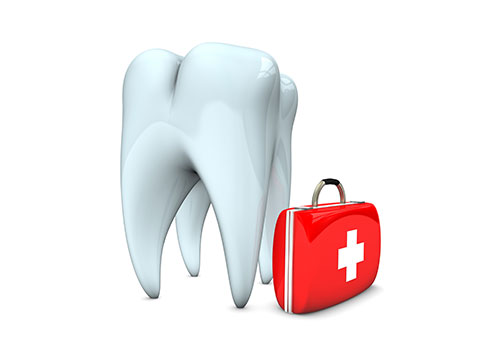Many of our patients have similar questions and concerns. We are often asked questions about when a patient should call the dentist. What is a true dental emergency and what is considered a non-emergency. This chart should help you to determine whether or not you or your family members are experiencing a dental emergency. At our office, we always reserve time in our schedule to ensure that your needs are attended to in a prompt, efficient and caring manner.

Keep this chart in a handy location to refer if you are experiencing any of the symptoms listed below. If you are experiencing any discomfort or difficulty with function, always feel free to call our office to ask any questions. Our team will be happy to help.
| Symptom | Is It An Emergency? | What Action Should I Take? |
|---|---|---|
| Dull, continuous ache | Non-emergency | Schedule an appointment at your earliest convenience. |
| Sudden, severe discomfort, accompanied by swelling | It could be an emergency | Apply a cold compress and see your dentist immediately. |
| Abscessed tooth | Emergency | An abscess is a localised pus formation usually located at the root end of the tooth. If the condition is acute and there is infection present the dentist will likely prescribe antibiotics and analgesics before attempting to perform root canal therapy. |
| Knocked out tooth | Emergency | Control the bleeding by applying direct pressure with a cold compress. Do not remove or be alarmed, as there may be extensive bleeding. Transport the tooth wrapped in a wet cloth or a glass of milk. Do not rinse the tooth. |
| Broken tooth | Emergency | Depending on the severity of the fracture it could cause an infection which is much more difficult to treat. |
| Extruded Tooth | Emergency | Don’t try to force the tooth back into its socket. Gently reposition the tooth to its normal alignment. Hold the tooth in place with gauze or a tissue. You must see your dentist immediately. |
| Facial fracture | Emergency | Make sure the airway is open and transport the victim to medical aid as soon as possible, either a hospital emergency room or call 911. |
| Sensitivity to cold | Non-Emergency | Your tooth could be sensitive for a number of reasons. Never apply aspirin or heat to the tooth. Call the dentist and arrange an appointment as soon as possible. |
| Sensitivity to heat | Urgency | Sensitivity to heat can indicate that infection is present. See your dentist as soon as possible. If swelling and/or fever are present, consider it to be an emergency. An abscess could be forming. |
| Broken Braces and Wires | Urgency | If the broken appliance can be removed easily, take it out carefully. If not, cover the sharp or protruding portion with gauze, cotton balls or even chewing gum. Do not remove this and see your dentist immediately. |
